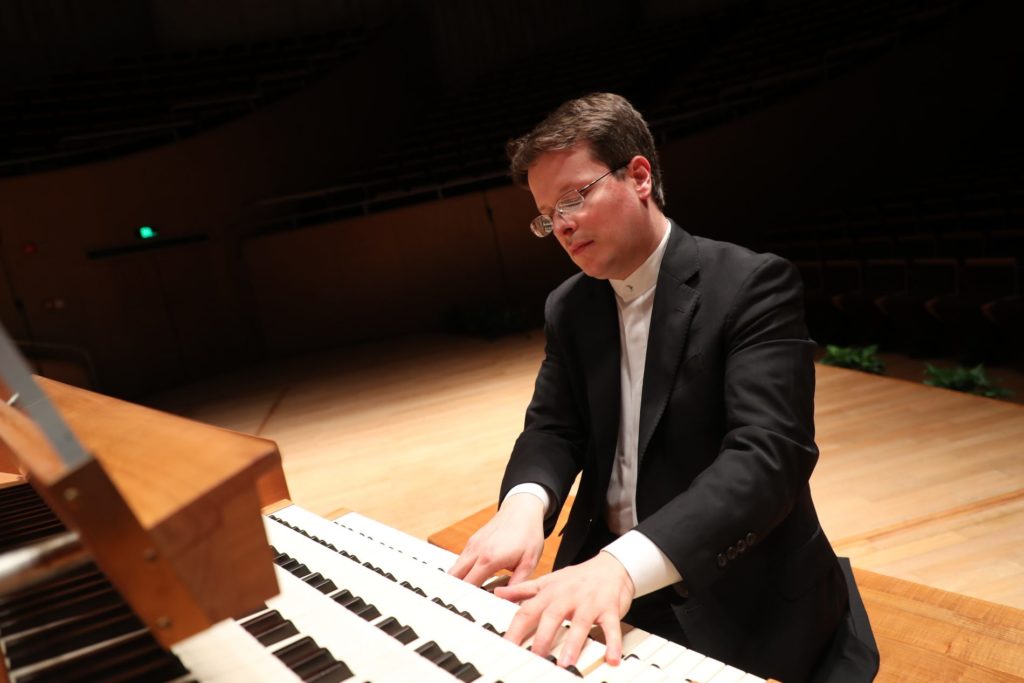
The last time organist Paul Jacobs visited Nashville he and the orchestra won a Grammy for their recording of Michael Daugherty’s Once Upon A Castle. Now as he and conductor Giancarlo Guerrero continue their collaboration, Jacobs is back for another live recording – this time it’s Horatio Parker’s Concerto for Organ.
Jacobs is known for his astounding feats on the organ, such as his 18-hour marathon of the complete organ works of JS Bach, or performances of all of Olivier Messaen’s organ music from memory. But equally impressive is the list of orchestras with which he has performed as a soloist. He and Giancarlo Guerrero will head to Germany and Poland later this season for additional performances together, with a final stop back in Nashville for Hindemith’s Organ Concerto next year. Jacobs took the time to answer 6 questions about organ playing.
How did you end up choosing to play the organ?
One might say that an instrument–like music, itself–chooses you; you don’t choose it. This said, at age five I began studying the piano. A few years later, I experienced the music of 20th-century French composer Jean Langlais and was instantly captivated by the power, color, and raw excitement evoked by the massive pipe organ. When tall enough to reach the pedals (at age 11), it was finally time to play what Mozart called the King of Instruments.
You’ve been able to play some of the most magnificent instruments in the world – is there one particular organ that stands out as your absolute favorite to play?
It’s impossible to name a favorite organ, given the unending variety of instruments regularly encountered. Unlike pianos, organs differ radically in size, construction and style from one another. This said, the Schermerhorn organ, built by the Schoenstein Company, is truly magnificent. It offers a rich, dynamic tonal palette for the organist, not to mention plenty of octane in the lowest registers to create an earthquake! Equally thrilling is making music with the Nashville Symphony and Giancarlo Guerrero.
How would you like to see the world of organ music grow in the next decade?
I’ve dedicated my life to increasing the openness of the classical music establishment to organ playing, as a solo instrument and through a vast trove of collaborative repertoire spanning the past six centuries (including countless organ concerti, such as the Parker). Once a New York Times critic told me that, in his experience, the two most devoted groups of music lovers were opera buffs and organ fans. Many in classical music seem unaware of the widespread devotion and support the King of Instruments actually has. So it’s necessary to continue bridging this gap.
Your performances of lengthy, complete sets of pieces have become a signature for you. How do you prepare for that level of mental and physical focus?
There’s nothing particularly unusual to divulge regarding such physical or mental preparations. I can say, however, that not all music delivers the same rewards. Some of it is meant purely to entertain, which certainly has its place. We all appreciate moments of levity. But other music seeks to draw us in more deeply to the human experience–if we’re willing to go there. The music that I, personally, love the most tends to be emotionally challenging and spiritually profound. I long to connect with others who seek the same.
You had your first church job at age 15, which is the same age as Horatio Parker’s start of his composition career. What other kinship do you find with Parker as you prepare the concerto?
Parker’s organ concerto is a hidden jewel, so, hopefully, these performances (and subsequent recording) will provide the increased recognition it deserves. In preparing this work, Parker’s masterful skill as a composer becomes clear. His style uplifts the spirit of any honest listener willing to become vulnerable to its beauty. As a performer, I desire to do precisely this, and am grateful that such music exists.
What advice do you have for young organists?
Work. And work passionately. It’s crucial to build a strong technical foundation early in one’s development, especially good practice habits, which should become as natural as any other daily routine (though never mundane). Also, organists tend to exist in a cocoon–personally and professionally–so get out of it. Be fully committed to Music and to unlocking its secrets, not just to your own niche instrument. Listen regularly to symphonies, chamber music, and opera. Finally, don’t neglect developing your mind, which, unfortunately, many musicians do inadequately. Constantly ask questions and think critically.
Paul Jacobs performs Horatio Parker’s “Concerto for Organ” with the Nashville Symphony Nov. 21-23. The performance will be broadcast on 91Classical this summer.